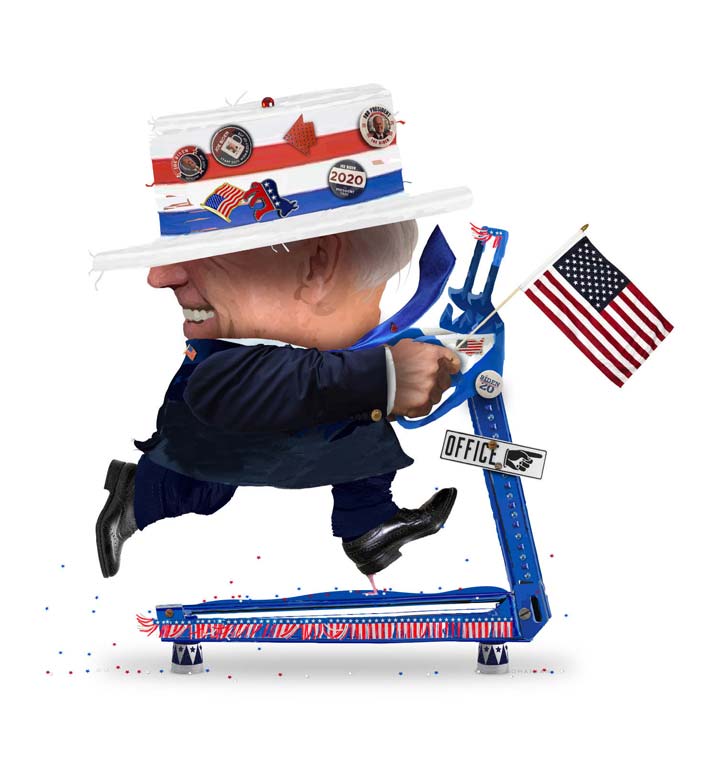
The president gave a thunderous address in Philadelphia on Tuesday denouncing alleged Republican voter suppression. Playing on the darkest fears of Democrats and layering on the adjectival overkill, Biden blatantly distorted Republican state-level election laws in a frankly demagogic speech.
Biden rightly excoriated former President Donald Trump, if not by name, for his conduct since the election, saying it's been "selfishness," not "statesmanship." True enough. If Trump runs again in 2024 and loses again, there's no reason to believe he wouldn't, once again, claim he was robbed.
There is a good case for tightening up the convoluted Electoral Count Act that might be used by partisans of Trump (or some other Republican or Democratic candidate in the future) to try to change an election outcome at the federal level.
That's not what Biden talked about, though. Instead, he lashed the Republican election bills. The approach seems designed to mirror Trump's effort to undermine his side's faith in the electoral process with a countervailing effort to undermine his own side's faith in the electoral process.
Indeed, if Democrats lose in 2022 or 2024, Biden's speech may be seen by Democrats as providing an equally corrosive excuse — it was Republican voter suppression.
This tack already got a successful test run by Stacey Abrams when she lost in the 2018 Georgia gubernatorial campaign. She refused to concede and today almost all Democrats treat her as the rightful victor, even though there's no evidence the election was anything but free and fair (with robust turnout).
According to Biden, the GOP election rules are one of the most grievous affronts to our democratic rights ever. "The 21st century Jim Crow assault is real," he said. "It's unrelenting, and we're going to challenge it vigorously."
He called this push "the most serious test of our democracy since the Civil War," making sure to note that the statement wasn't hyperbole, even though it's hard to imagine a more hyperbolic assertion. Half the country left the union during the Civil War, threatened Washington with periodic armed raids, and fought for its independence in a war that killed more than 600,000 people, which obviously doesn't bear comparison to, say, passing voter ID laws.
At one point, Biden referred to "Georgia's vicious anti-voting law."
As the president himself might say, "Come on, man."
Although it tends to be Exhibit A in the Democratic argument against GOP voting initiatives, the Georgia law was fully debated prior to its passage, and refined in the legislative process. The result is well-crafted legislation that is not anywhere close to hearkening back to Lester Maddox.
First of all, the Georgia law increases the hours available for early voting, and it preserves ballot-drop boxes, an emergency measure adopted during the pandemic, although it tightens up the rules around them.
Other key provisions have entirely reasonable rationales. The law dispenses with signature match, which Abrams has criticized as unreliable, to verify absentee ballots; instead, it asks that voters provide a driver's license or state-ID number.
Long lines at polling place have been a perennial complaint in Georgia, and, it must be said, largely the responsibility of Democratic-run local jurisdictions. Where lines are an endemic problem, the new law mandates that counties either reduce the size of the relevant precincts, or add new equipment or workers.
Provisional ballots are tricky for election administrators to handle, and Abrams has long complained that they aren't reliably counted. The law seeks to reduce the number of provisional ballots by diminishing a leading reason people vote provisionally, i.e., that they show up at the wrong precinct. Going forward, election workers will direct such voters to the correct precinct.
In the same spirit, the law says voters can't request absentee ballots later than 11 days prior to the election — because many absentee ballots are rejected for arriving too late.
Even if you oppose every single one of these measures, Georgia will still have a notably open election system, with online registration, extensive early voting, and no-excuse absentee voting. As Henry Olsen of the Washington Post points out, most advanced countries around the world don't have all the different ways to vote that Georgia does. "If Georgia's elections are undemocratic," Olsen writes, "then almost all of our democratic allies are also undemocratic."
Biden either doesn't realize this, or doesn't care — in other words, he's either being recklessly irresponsible or deeply cynical (and probably both).
The presumption that marginal changes in election laws measurably affect turnout, a key assumption of the Democratic case against GOP election bills, is simply erroneous. Voter ID laws haven't suppressed turnout. The Supreme Court's Shelby decision ending federal pre-clearance of voting changes in certain states hasn't stopped minorities from voting. And states that adopted no-excuse mail-in balloting last year didn't have higher turnout than states that didn't.
No matter how high octane his attacks on the GOP laws, Biden is unlikely to get the Democratic election bill, HR1, over the finish line in the Senate. But as Abrams has proved, the charge of voter-suppression is a powerful partisan motivator.
Biden made an implicit nod in this direction when he said, "We'll engage in an all-out effort to educate voters about the changing laws, register them to vote, and then get the vote out."
Never mind that this wouldn't be possible under a new Jim Crow.
When it comes to juicing up his own supporters, the Biden speech may have been effective, but it wasn't statesmanship — or remotely truthful.
(COMMENT, BELOW)


 Contact The Editor
Contact The Editor
 Articles By This Author
Articles By This Author